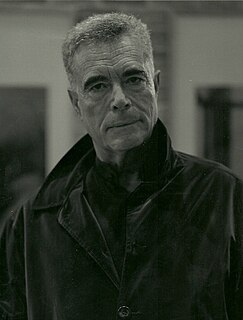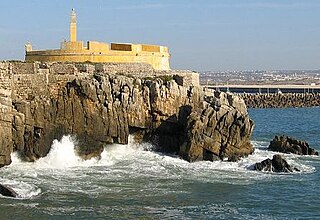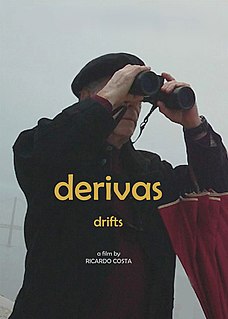This article is being considered for deletion in accordance with Wikipedia's deletion policy. Please share your thoughts on the matter at this article's entry on the Articles for deletion page. |

Ricardo Costa | |
|---|---|
| Born | January 25, 1940 Peniche, Portugal |
| Occupation | Film director, film producer, film writer, writer on vision [ disambiguation needed ] and language |
Mists (Brumas), 2003, is a Portuguese feature film by Ricardo Costa. It Is the first of a sequel docufiction trilogy entitled Faraways (Longes). The second one is Drifts (Derivas) and the third one Cliffs (Arribas) [1]

Portuguese people are a Romance ethnic group indigenous to Portugal that share a common Portuguese culture and speak Portuguese. Their predominant religion is Christianity, mainly Roman Catholicism, though vast segments of the population, especially the younger generations, have no religious affiliation. Historically, the Portuguese people's heritage largely includes the pre-Celts and Celts, who became culturally Romanized during the conquest of the region by the ancient Romans. A number of Portuguese also can trace descent from Germanic tribes who arrived after the Roman period as ruling elites, including the Suebi and Visigoths in northern Portugal and central Portugal. Finally, also limited converted Jewish and Berbers as a result of the Moorish occupation of the Iberian Peninsula, especially in the Algarve region of southern Portugal.
A feature film, feature-length film, or theatrical film is a film with a running time long enough to be considered the principal or sole film to fill a program. The term feature film originally referred to the main, full-length film in a cinema program that also included a short film and often a newsreel. The notion of how long a feature film should be has varied according to time and place. According to the Academy of Motion Picture Arts and Sciences, the American Film Institute and the British Film Institute, a feature film runs for more than 40 minutes, while the Screen Actors Guild asserts that a feature's running time is 75 minutes or longer.

Ricardo Costa is a Portuguese film director and producer.
Contents
The film premiered commercially in Portugal at the Quarteto cinema in Lisbon on 9 November 2006, on 16 November at the Palmeiras cinema in Oeiras, as well as at the cinema Quarto Crescente, in Peniche (Portugal), where it was shot.

Lisbon is the capital and the largest city of Portugal, with an estimated population of 505,526 within its administrative limits in an area of 100.05 km2. Lisbon's urban area extends beyond the city's administrative limits with a population of around 2.8 million people, being the 11th-most populous urban area in the European Union. About 3 million people live in the Lisbon metropolitan area, including the Portuguese Riviera. It is mainland Europe's westernmost capital city and the only one along the Atlantic coast. Lisbon lies in the western Iberian Peninsula on the Atlantic Ocean and the River Tagus. The westernmost portions of its metro area form the westernmost point of Continental Europe, which is known as Cabo da Roca, located in the Sintra Mountains.
Mists was screened in the US in New York at the Quad Cinema on March 23, 2011, with subsequent screenings in other US cities.

The Quad Cinema is New York City's first small four-screen multiplex theater. Located at 34 West 13th Street in Greenwich Village, it was opened by entrepreneur Maurice Kanbar, along with his younger brother Elliott S. Kanbar in October 1972. It has been described as "one of the oldest independent cinemas in the city" and "a vibrant center for art house films."















